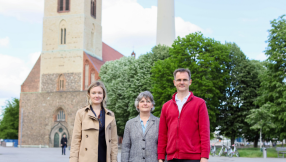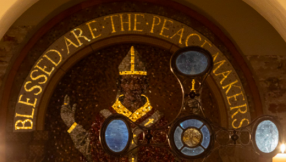24th May - Wesley Day for Methodists Worldwide
John Wesley, the father of the Methodist church, was born in 1703, around 300 years ago. He was raised as an Anglican and graduated from the University of Oxford. He started his vocation as an ordained deacon one year after his graduation. In 1727, he was ordained as a priest. He started his 55-year journal in 1735 which has become one of the most important books in Methodism.
According to his journal when he was still a young Anglican priest, he suffered from serious spiritual anxiety. He was obsessively anxious about sin, death and God’s judgment. He was also obsessive about his prayer disciplines, confessing sins and works of charity. These struggles made Wesley ask the question- What must we do to be saved? - a question that initiated the movement of Methodism.
Later, in 1738, the 35-year-old John Wesley had a profound religious experience. After worshipping with a group of German Moravians, who believed in a deeply felt, inward spirituality, he finally experienced a sense of God’s forgiveness as he never had before. It happened in a chapel on Aldersgate Street in London.
“I felt my heart strangely warmed,” John Wesley wrote about the experience in his Journal. “I felt I did trust in Christ, Christ alone for salvation, and an assurance was given me that He had taken away my sins, even mine.”
May 24th 1783 was the day John Wesley’s heart was “strangely warmed” because of the realisation of salvation through grace and only by grace, and so is often heralded as the day the Methodist movement was born.
On Methodist church calendars, 24th May is marked as 'Wesley Day' and the Sunday closest to 24th May is known as the Aldersgate Sunday.
However, Albert Outler, the most authoritative Wesleyan scholar, said that John Wesley’s mystical Aldersgate experience did not completely heal his spiritual anxiety according to Wesley’s journal. Wesley’s true release in spiritual doubts and despairs began to lessen after the 2nd April 1739 when he decided to evangelise to the poor coal miners in Bristol.
Coal mining was the most undesirable job available in the 18th century England. Most coal miners suffered from poverty and were not welcomed in Anglican churches. Evangelist George Whitfield, who is known as a Presbyterian today, invited Wesley to preach to them, which if accepted would mean the loss of a respectable career as an Anglican priest to Wesley.
However, after Wesley’s immersion in the coal miner’s ministry, he finally began to experience the sense of salvation and forgiveness and peace that he had been seeking so desperately through the merciful work of God on these unclean coal miners he had witnessed.
Wesley belief was that people are saved by faith and the free gift of God’s love. Nobody can do anything to earn or merit God’s love and salvation. It is a gift. It is grace. This has become the confession of faith to 74 million Methodists in 135 countries around the world.
This year, Aldersgate Sunday was celebrated on 23rd May. The Methodist Church of the Great Britain referred to it as a real opportunity to give thanks to God for the work of the Wesley Brothers and for the people called Methodist. On the 24th May, memorial services will be held in Methodist Churches across the UK.













